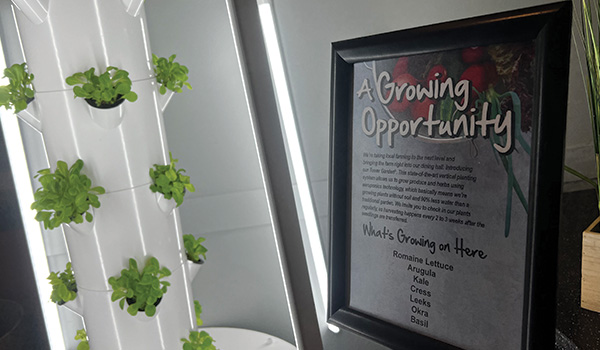Maroon, Gold and GREEN
Greenhouse Projects are Underway Through Generous Gifts
Gannon, in partnership with the Regional Science Consortium, began site development to create an on-campus greenhouse. With an estimated completion date of spring 2024, it is one of six initiatives under Gannon’s Project NePTWNE to promote ecological well-being.

The greenhouse will be a year-round, environmentally controlled 21-foot by 72-foot growing space. It will provide opportunities for Gannon and community members to engage in sustainability for Erie through research and outreach programming on native plants used to restore wetlands, protecting against dune and coastal erosion, expanding native plant seed banks and supporting neighborhood community gardens.

The university received generous gifts toward the greenhouse development, including funds from Erie Insurance as part of Pennsylvania’s Educational Improvement Tax Credit program as well as in-kind and direct donations from Building Systems, Inc.
A notable gift was also made by Villa Maria College alumna Marie Spaeder Haas ’73 and her late husband, Frank Haas ’61, Gannon alumnus and long-time faculty member, to make possible the research, education and outreach that is planned to bring the community together at the facility. It was Frank Haas’s wish to carry on their legacy through gifts to Gannon to inspire others to join them in supporting initiatives that give students cutting-edge opportunities.
Introducing Metz Tower Garden
Beyer Hall Cafeteria is taking local farming to the next level with a new tower garden. As part of Metz Culinary Management’s sustainability efforts, this vertical planting system grows produce and herbs indoors using aeroponics technology, requiring no soil and 90 percent less water than a traditional garden. The fresh produce is used by the kitchen staff on a daily basis in soups, hot entrees and sauces.

Litter Capture Devices Piloted in Presque Isle Bay
With funding from the Ocean Conservancy, Keep Pennsylvania Beautiful collaborated with the Regional Science Consortium and Gannon to pilot devices that capture debris in the water. The devices, known as litter control booms, are designed to limit the spread of debris and collect the floating litter to be removed from the waterway. Gannon students and RSC interns Santiago Torres and Kendall McGarity worked to maintain the booms over the summer. They monitored the sites, collected the accumulated trash from the booms, and evaluated data that determined the types and sources of trash and the effectiveness of the device. The device and their work will eventually help determine how to reduce trash entering the waterway.

Stay up-to-date with all of Gannon’s news at gannon.edu/newsworthy